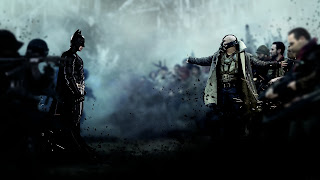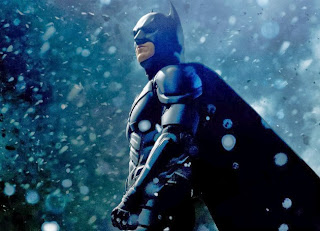★★
 But for all these unsatisfying elements of The Dark Knight
Rises, there are aspects of the film that warrant note. One of the most interesting is that Batman is a past-his-prime male who has to try to find his place in the world outside the role he’s held for so long. Dark Knight
Rises gives us a superhero that isn’t as super as he used to be, who is
physically vulnerable and who can be tricked.
He’s a superhero we don’t see
often. Dark Knight Rises also makes a
political nod in the direction of today’s situation of a shrinking middle class
and an underclass with no upward mobility.
Catwoman resents the rich in an almost Robin Hood way, and Bane’s
takeover of Gotham appeals to resentment against the 10%. But if Dark Knight Rises has a political
message, it’s difficult to read it clearly.
There’s a position here against Tea Party anarchy, but there’s also a
feeling that Bruce Wayne and the moneyed class manage to keep order much better
than the mob rule Bane incit and manipulates. The ideology here isn’t clear, or it’s one that many of us might not want to think about.
But for all these unsatisfying elements of The Dark Knight
Rises, there are aspects of the film that warrant note. One of the most interesting is that Batman is a past-his-prime male who has to try to find his place in the world outside the role he’s held for so long. Dark Knight
Rises gives us a superhero that isn’t as super as he used to be, who is
physically vulnerable and who can be tricked.
He’s a superhero we don’t see
often. Dark Knight Rises also makes a
political nod in the direction of today’s situation of a shrinking middle class
and an underclass with no upward mobility.
Catwoman resents the rich in an almost Robin Hood way, and Bane’s
takeover of Gotham appeals to resentment against the 10%. But if Dark Knight Rises has a political
message, it’s difficult to read it clearly.
There’s a position here against Tea Party anarchy, but there’s also a
feeling that Bruce Wayne and the moneyed class manage to keep order much better
than the mob rule Bane incit and manipulates. The ideology here isn’t clear, or it’s one that many of us might not want to think about.
If Dostoyevsky worked for Stan Lee, we’d get something like
The Dark Night Rises. An aging, battered
Bruce Wayne opens the film in seclusion, licking his wounds. Gotham crime rebounds, and Wayne goes
through mental angst to decide if he should don the cape anew. One he decides,
and with the aid of a remarkable brace, he recovers his physical agility. However, he is soon betrayed by the woman he
loves (twice), loses his entire fortune, and gets badly beaten yet again by Bane, who
exiles him to an underground prison in China (or someplace similar).
By comparison, Raskolnikov didn’t have much to deal with. And into this unrelenting stream of pain,
is added the infirmity of Commissioner Gordon and the fall of Gotham City into
a sort of Reign of Terror with its own Robespierre.
Then Batman defeats the bad guys and goes to Florence for
coffee with his repentant girlfriend. I
kid you not.
The Dark Night Rises is a sprawl of cinema that veers
from one mood to another and from one plot point to another. First, Batman is crushed, but comes back to win the
second round. He’s imprisoned with little explanation, and he gets back to
Gotham with little explanation. To a
degree, this aesthetic is true to the Marvel source, but on the screen, it
becomes long and even annoying. And
Nolan isn’t inclined to pare his story down to a more fundamental narrative focus
with consistent characters and values. When
we discover that Bane isn’t the real bad guy but that Talia is, this reveal
nearly takes the wind out of the story; we lose Bane’s plot energy, but Talia
doesn’t have the story interest to replace him. In the first 90% of the film, Batman
undergoes so much pain and loss that we might be forgiven if we eventually wish
he would indeed give up the cowl so his relentless pain would ease.
 But for all these unsatisfying elements of The Dark Knight
Rises, there are aspects of the film that warrant note. One of the most interesting is that Batman is a past-his-prime male who has to try to find his place in the world outside the role he’s held for so long. Dark Knight
Rises gives us a superhero that isn’t as super as he used to be, who is
physically vulnerable and who can be tricked.
He’s a superhero we don’t see
often. Dark Knight Rises also makes a
political nod in the direction of today’s situation of a shrinking middle class
and an underclass with no upward mobility.
Catwoman resents the rich in an almost Robin Hood way, and Bane’s
takeover of Gotham appeals to resentment against the 10%. But if Dark Knight Rises has a political
message, it’s difficult to read it clearly.
There’s a position here against Tea Party anarchy, but there’s also a
feeling that Bruce Wayne and the moneyed class manage to keep order much better
than the mob rule Bane incit and manipulates. The ideology here isn’t clear, or it’s one that many of us might not want to think about.
But for all these unsatisfying elements of The Dark Knight
Rises, there are aspects of the film that warrant note. One of the most interesting is that Batman is a past-his-prime male who has to try to find his place in the world outside the role he’s held for so long. Dark Knight
Rises gives us a superhero that isn’t as super as he used to be, who is
physically vulnerable and who can be tricked.
He’s a superhero we don’t see
often. Dark Knight Rises also makes a
political nod in the direction of today’s situation of a shrinking middle class
and an underclass with no upward mobility.
Catwoman resents the rich in an almost Robin Hood way, and Bane’s
takeover of Gotham appeals to resentment against the 10%. But if Dark Knight Rises has a political
message, it’s difficult to read it clearly.
There’s a position here against Tea Party anarchy, but there’s also a
feeling that Bruce Wayne and the moneyed class manage to keep order much better
than the mob rule Bane incit and manipulates. The ideology here isn’t clear, or it’s one that many of us might not want to think about.
As with the other two installments of Batman -- and many of
his other films – Nolan goes for gut moments at the expense of the overall film. Dark Knight Rises isn’t nearly as rambling
and fractured as its immediate predecessor, but it’s not a very satisfying either.

